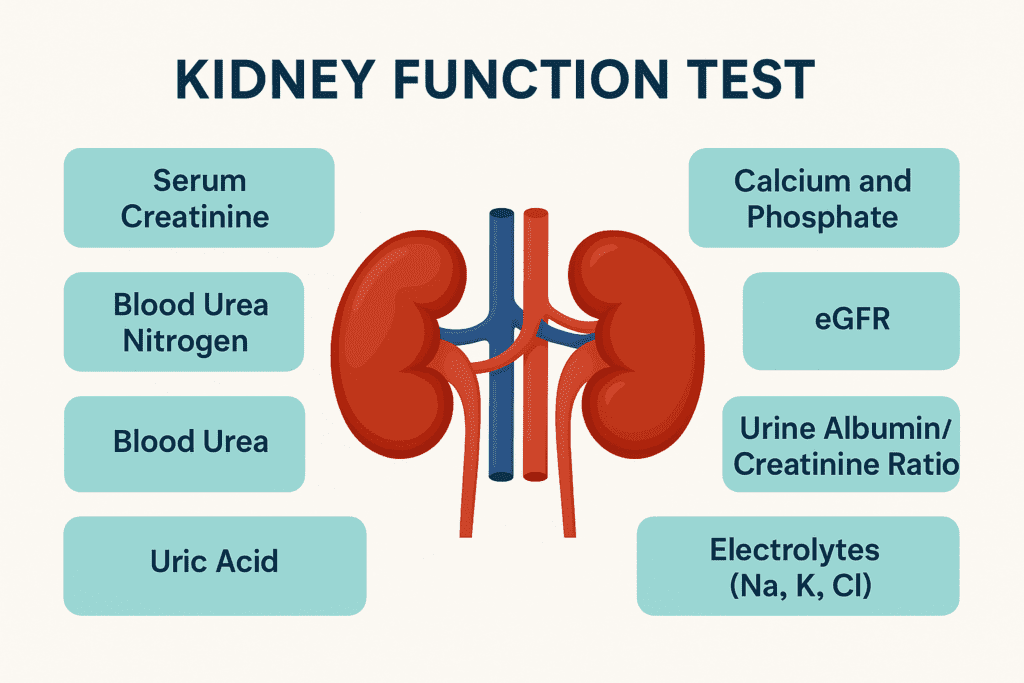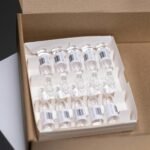Kidney Function Test (KFT): A Comprehensive Guide to Diagnosis, Test Procedures, and Clinical Interpretation
Introduction
The kidneys are vital organs responsible for maintaining the body’s internal environment by filtering waste products, regulating electrolyte balance, maintaining fluid levels, and producing hormones that regulate blood pressure and red blood cell production. A Kidney Function Test (KFT) is a panel of tests used to assess how well the kidneys are functioning. These tests are crucial in the early diagnosis and monitoring of kidney diseases, diabetes, hypertension, and conditions that may impair renal function.

Why Kidney Function Testing is Important
KFT helps in:
- Early detection of kidney disease before symptoms arise
- Monitoring progression of kidney disorders
- Assessing treatment response in patients with chronic kidney disease (CKD)
- Evaluating kidney function before prescribing certain drugs
- Guiding dialysis decisions in patients with end-stage renal disease
Common Symptoms That May Require KFT
- Swelling in legs, ankles, or face
- Fatigue
- Frequent urination, especially at night
- Foamy or bloody urine
- Unexplained nausea or vomiting
- High blood pressure
- History of diabetes or hypertension
Components of Kidney Function Test
A standard KFT includes the following tests:
| Sr. No. | Test Name | Purpose |
|---|---|---|
| 1 | Serum Creatinine | Measures waste excreted by kidneys |
| 2 | Blood Urea Nitrogen | Assesses protein metabolism and kidney clearance |
| 3 | Blood Urea | Urea is a by-product of protein metabolism |
| 4 | Uric Acid | Evaluates purine metabolism and kidney excretion |
| 5 | Electrolytes (Na, K, Cl) | Monitors fluid and acid-base balance |
| 6 | Calcium and Phosphate | Imbalances suggest chronic kidney issues |
| 7 | eGFR (Estimated GFR) | Estimates kidney filtration rate |
| 8 | Urine Albumin/Creatinine Ratio | Detects early damage to glomeruli |
Detailed Explanation of Each Test
1. Serum Creatinine
What It Is:
Creatinine is a waste product of muscle metabolism that is excreted by the kidneys.
Normal Range:
| Group | Range (mg/dL) |
|---|---|
| Men | 0.7 – 1.3 |
| Women | 0.6 – 1.1 |
| Children | 0.3 – 1.0 |
Clinical Significance:
- High levels may indicate kidney impairment.
- Slightly elevated values may be normal in athletes due to high muscle mass.
- Creatinine levels alone are not definitive — hence used with eGFR.
2. Blood Urea Nitrogen (BUN)
What It Is:
BUN reflects the amount of nitrogen in the blood from urea, a waste product formed in the liver from protein metabolism.
Normal Range:
| Age Group | Range (mg/dL) |
|---|---|
| Adults | 7 – 20 |
| Elderly | Up to 23 |
Clinical Significance:
- High BUN indicates reduced kidney filtration, dehydration, or high protein intake.
- Low BUN may suggest liver disease or malnutrition.
3. Blood Urea
What It Is:
Direct measurement of urea in blood, often used interchangeably with BUN in some countries.
Normal Range:
| Range (mg/dL) |
|---|
| 10 – 40 |
Note: Conversion between urea and BUN:
Urea = BUN × 2.14
4. Uric Acid
What It Is:
End product of purine metabolism. Excreted by kidneys.
Normal Range:
| Group | Range (mg/dL) |
|---|---|
| Men | 3.4 – 7.0 |
| Women | 2.4 – 6.0 |
Clinical Significance:
- Elevated levels seen in gout, renal failure, and cancer therapy.
- Chronic elevation may lead to nephropathy or kidney stones.
5. Electrolyte Panel (Na+, K+, Cl−)
These electrolytes help maintain osmotic balance, acid-base status, and nerve function.
| Electrolyte | Normal Range | Clinical Implications |
|---|---|---|
| Sodium (Na⁺) | 135–145 mmol/L | Imbalance causes dehydration, edema |
| Potassium (K⁺) | 3.5–5.0 mmol/L | Hyperkalemia in renal failure |
| Chloride (Cl⁻) | 96–106 mmol/L | Acid-base disturbances |
6. Calcium and Phosphate
Calcium Normal Range: 8.5 – 10.5 mg/dL
Phosphate Normal Range: 2.5 – 4.5 mg/dL
Significance:
- Imbalance is common in chronic kidney disease (CKD)
- Hypocalcemia and hyperphosphatemia lead to secondary hyperparathyroidism
7. Estimated Glomerular Filtration Rate (eGFR)
What It Is:
A mathematical estimate of kidney filtering capacity, calculated using serum creatinine, age, sex, and race.
Normal Range:
| eGFR (mL/min/1.73m²) | Interpretation |
|---|---|
| >90 | Normal function |
| 60–89 | Mild decrease |
| 30–59 | Moderate impairment |
| 15–29 | Severe impairment |
| <15 | Kidney failure (ESRD) |
8. Urine Albumin-to-Creatinine Ratio (ACR)
What It Is:
Measures protein leakage into urine — an early marker of glomerular damage.
Normal Range:
| ACR Value (mg/g) | Interpretation |
|---|---|
| <30 | Normal |
| 30–300 | Microalbuminuria |
| >300 | Macroalbuminuria |
Sample Collection and Procedure
- Sample Type: Blood (venous) and random or early morning urine
- Fasting Required: Not necessarily, but fasting may be advised for accurate creatinine values
- Procedure:
- Venous blood draw under sterile conditions
- Urine sample collection in sterile container
- Processing in automated analyzers
Reporting Time
| Test Component | Report Timing |
|---|---|
| Serum Creatinine | Same day (2–4 hrs) |
| BUN/Blood Urea | Same day |
| Uric Acid | 1 day |
| Electrolytes | 2–4 hours |
| Calcium/Phosphate | 1 day |
| eGFR | Calculated with creatinine |
| ACR (Urine) | 1 day |
Interpretation of Kidney Function Test Results
To determine kidney health, results are interpreted in combination:
| Test Parameter | Normal | Mild Dysfunction | Moderate | Severe |
|---|---|---|---|---|
| Creatinine | <1.2 | 1.2–1.5 | 1.5–2.5 | >2.5 |
| BUN | <20 | 20–30 | 30–50 | >50 |
| eGFR | >90 | 60–89 | 30–59 | <30 |
| ACR | <30 | 30–300 | >300 | >300 |
Note: Age, muscle mass, hydration status, and medication use can influence results.
Clinical Conditions Detected by KFT
- Acute Kidney Injury (AKI)
- Chronic Kidney Disease (CKD)
- Glomerulonephritis
- Kidney stones
- Dehydration
- Drug-induced nephrotoxicity (e.g., NSAIDs, aminoglycosides)
- Urinary Tract Obstruction
- Diabetic Nephropathy
- Hypertensive Nephropathy
Factors That Can Affect Kidney Test Results
- High protein diet (affects urea/BUN)
- Muscle mass (influences creatinine)
- Certain medications (e.g., diuretics, ACE inhibitors)
- Dehydration or overhydration
- Contrast dye from imaging studies
Preventive Measures for Healthy Kidneys
- Stay well hydrated
- Control blood sugar and blood pressure
- Avoid overuse of NSAIDs or painkillers
- Limit salt and processed foods
- Regular health checkups
- Avoid smoking and alcohol abuse
Conclusion
The Kidney Function Test is a critical diagnostic panel in modern clinical practice. It provides early insights into renal health and allows physicians to tailor interventions before irreversible damage occurs. Understanding each component of the KFT empowers healthcare professionals to provide better patient outcomes, and promotes awareness among patients for preventive care.
FAQs on Kidney Function Test
Q1. Can I take my regular medicines before a KFT?
Yes, but inform your doctor. Some medicines may affect kidney parameters.
Q2. Is fasting required before KFT?
Generally not. But in some labs, fasting may be advised for consistency.
Q3. How often should KFT be done in diabetic patients?
Every 6 months to 1 year, or as advised by your physician.
Q4. What is the most accurate indicator of kidney function?
eGFR is the best indicator for early and progressive kidney dysfunction.
Q5. What does a high creatinine level mean?
It usually indicates impaired kidney function but must be interpreted with eGFR.
Q6. Can kidney function improve after damage?
Mild or early damage can often be reversed with proper management.
For more regular updates you can visit our social media accounts,
Instagram: Follow us
Facebook: Follow us
WhatsApp: Join us
Telegram: Join us







